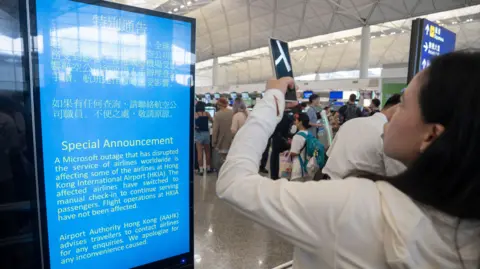
This article is more than
1 year old
Very few organisations will buy software from the US firm, partly due to its criticism of Beijing.
While most of the world was grappling with the blue screen of death on Friday, one country that managed to escape largely unscathed was China.
The reason is actually quite simple: CrowdStrike is hardly used there.
Very few organisations will buy software from an American firm that, in the past, has been vocal about the cyber-security threat posed by Beijing.
Additionally, China is not as reliant on Microsoft as the rest of the world. Domestic companies such as Alibaba, Tencent and Huawei are the dominant cloud providers.
So reports of outages in China, when they did come, were mainly at foreign firms or organisations. On Chinese social media sites, for example, some users complained they were not able to check into international chain hotels such as Sheraton, Marriott and Hyatt in Chinese cities.
Over recent years, government organisations, businesses and infrastructure operators have increasingly been replacing foreign IT systems with domestic ones. Some analysts like to call this parallel network the "splinternet".
"It's a testament to China's strategic handling of foreign tech operations," says Josh Kennedy White, a cybersecurity expert based in Singapore.
"Microsoft operates in China through a local partner, 21Vianet, which manages its services independently of its global infrastructure. This setup insulates China’s essential services - like banking and aviation - from global disruptions."Beijing sees avoiding reliance on foreign systems as a way of shoring up national security.
It is similar to the way some Western countries banned Chinese tech firm Huawei’s technology in 2019 - or the UK's move to ban the use of Chinese-owned TikTok on government devices in 2023.
Since then, the US has launched a concerted effort to ban sales of advanced semiconductor chip tech to China, as well as attempts to stop American companies from investing in Chinese technology. The US government says all of these restrictions are on national security grounds.

"Some countries constantly talk about security, generalise the concept of security, but ignore the real security, this is ironic," the editorial said.
The argument here is that the US tries to dictate the terms of who can use global technology and how it is used, yet one of its own companies has caused global chaos through lack of care.
The Global Times also took a jab at the internet giants who "monopolise" the industry: "Relying solely on top companies to lead network security efforts, as some countries advocate, may hinder not just the inclusive sharing of governance outcomes but also introduce new security risks."
The reference to “sharing” is probably an allusion to the debate over intellectual property insofar as China is often accused of copying or stealing western technology. Beijing insists this is not the case and advocates for an open global technology marketplace - while still keeping tight control over its domestic scene.
Not everything was totally unaffected in China, however. A small numbers of workers expressed thanks to an American software giant for ending their working week early.
“Thank you Microsoft for an early vacation,” was trending on the social media site Weibo on Friday, with users posting pictures of blue error screens.